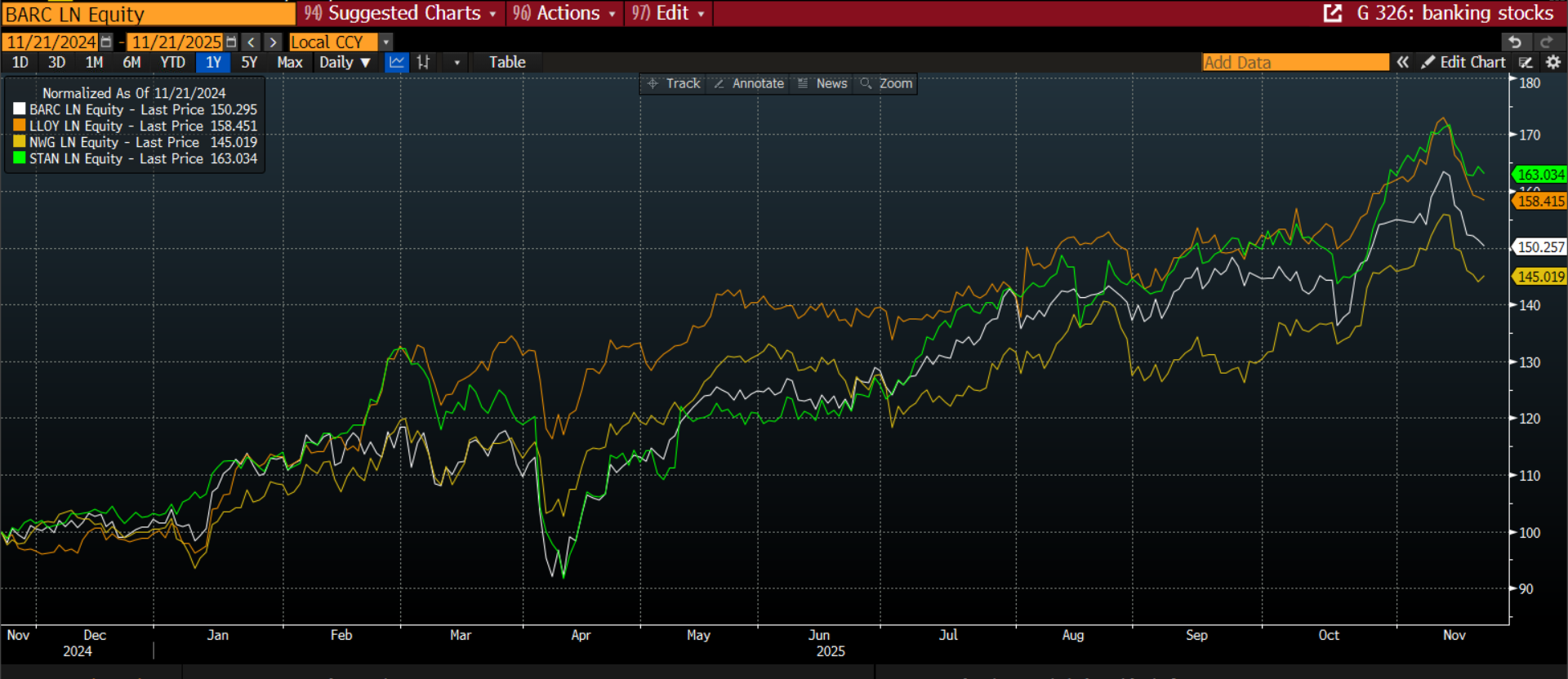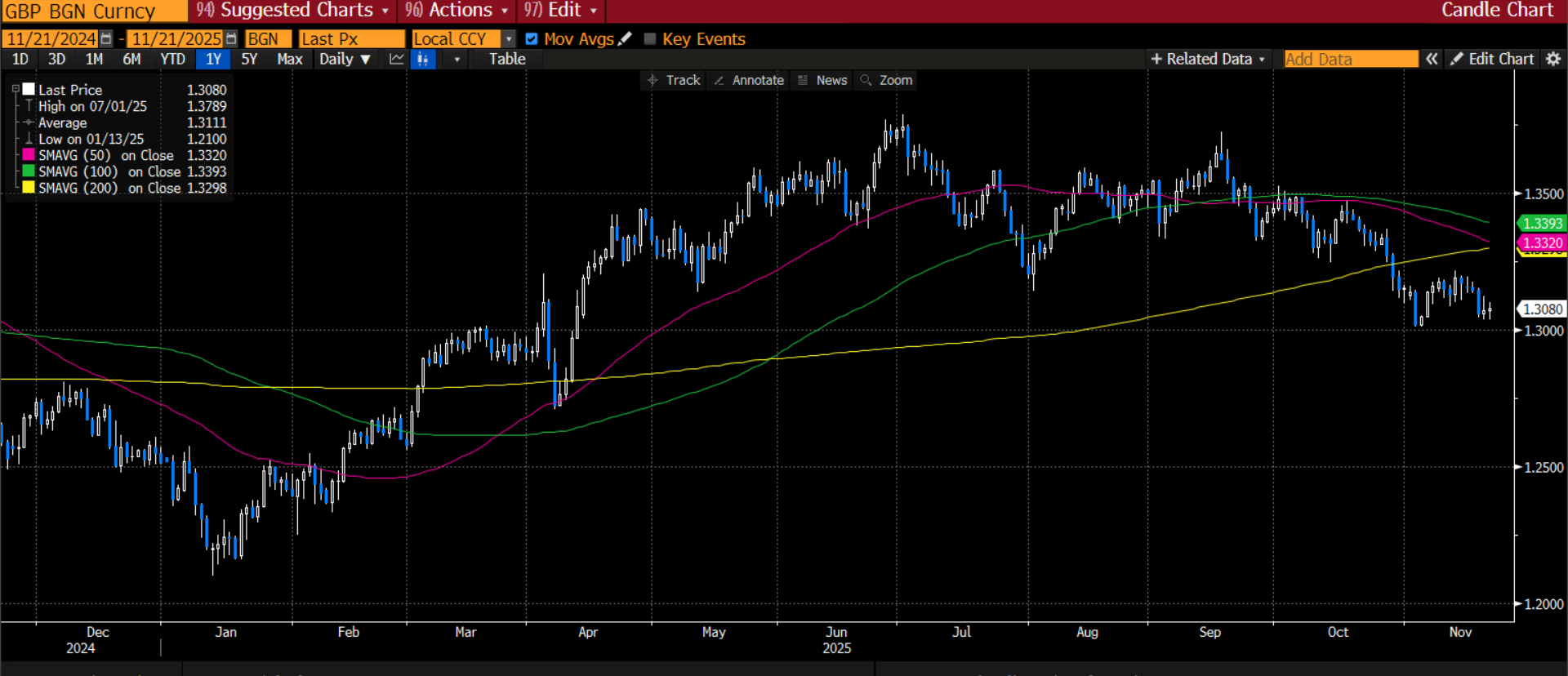- Budget has become a political event with a side of economics
- Economic growth falters dealing blow to Chancellor
- The Chancellor’s huge and tricky task
- The bond market: fiscal headroom hopes to avoid constant re-jig of UK’s fiscal plumbing
- The equity outlook: UK benefits from global volatility, but banks are in the cross hairs
- The pound view: negativity already priced in
- The Budget epilogue: more political chaos
- Budget has become a political event with a side of economics
- Economic growth falters dealing blow to Chancellor
- The Chancellor’s huge and tricky task
- The bond market: fiscal headroom hopes to avoid constant re-jig of UK’s fiscal plumbing
- The equity outlook: UK benefits from global volatility, but banks are in the cross hairs
- The pound view: negativity already priced in
- The Budget epilogue: more political chaos
On Wednesday 26th November, the UK Chancellor will deliver her second full budget. This feels like a major political event, with economics on the side. It could determine whether Kier Starmer remains as Prime Minister, as well as attempting to balance the UK’s precarious books.
In my long history of analysing budgets, I have never known one with such a long run up, or that has caused such political chaos, excluding the 2022 mini budget. The Chancellor and the Treasury have been drip-feeding potential tax increases since the summer. Mansion taxes, wealth taxes, income taxes, tax allowances, tax thresholds, fuel duty, and triple locks have all been fighting for space in the headlines. Ideas have been leaked to the press, tested through public opinion, abandoned and then brought back to life, in the case of the mansion tax. This is a strange way to prepare for a budget, and it can be partly blamed for October’s weak retail sales and the deeply negative consumer confidence reading for November from GfK.
The Chancellor’s huge and tricky task
However, aside from the media circus, the Chancellor has a huge task to balance the government’s books. The OBR is expected to show that the UK’s deficit has grown faster than expected, with fiscal slippage of £20bn more than the OBR estimated in March. The Chancellor is expected to deep-fill this hole to avoid more tax raising budgets, and she could raise tax by £30bn on Wednesday. However, by ruling out income tax increases last Friday, and opting for a smorgasbord of smaller increases instead, it is hard to know if she will be able to get the extra fiscal headroom that the bond market is demanding.
Below, we look at how UK asset prices have reacted in the run up to this Budget and how the Chancellor’s fiscal decisions could determine where they go next.
The bond market: fiscal headroom hopes to avoid constant re-jig of UK’s fiscal plumbing
This is the market that matters the most for the Chancellor and its reaction to her Budget could determine how long she remains in number 11.
Ahead of this budget, the bond market had warmed to hopes that the Chancellor would raise her fiscal headroom, which could avoid future budgets having to re-jig the UK’s fiscal plumbing. Last year’s fiscal headroom of just under £10bn has been eaten up by reversals on public sector spending cuts including welfare cuts and cuts to winter fuel payments for pensioners. This is why the Chancellor needs to find more revenue through higher taxes.
The UK’s biggest bond investors have called on the Chancellor to more than double her fiscal headroom to £20bn - £30bn. When the Chancellor hinted that she may break her manifesto pledge and raise income tax, UK bond yields fell sharply. The 10-year yield fell at a faster rate than its US and German counterparts over the early autumn. While last week’s reversal in income tax increases added some upside pressure to UK Gilt yields, as you can see below, on a normalized basis, even though UK yields are nominally higher than peers in Europe and the US, they have been moving in line with global norms this year.
In the past month, even accounting for last Friday’s jump in bond yields, UK 10-year yields are higher by 7bps, compared to a 13bp jump in German yields and a 10bp increase in US Treasury yields.
Chart 1: UK, German and US bond 10-year bond yields, adjusted to show how they move together.

Source: XTB and Bloomberg
However, the calm in the bond market may not last long. The UK has overshot borrowing forecasts by nearly £10bn this fiscal year, as tax receipts fall and public spending increases. A sensible approach would be to use this Budget to boost growth and to cut spending, that has become unaffordable since the tax receipts are not there to pay for it. Instead, the Chancellor is likely to use this budget to raise tax further, threatening the future growth outlook, and continue to increase public sector spending.
If this budget is contractionary for growth, then the bond vigilantes could come back to haunt the Chancellor, with bond yields turning higher. The government’s track record on growth is not good, and growth indicators have tumbled in recent months. UK November PMI data for manufacturing, services and construction are barely in expansionary territory, retail sales have plunged and Q4 GDP is expected to expand by a mere 0.1%.
For all her talk of being pro-growth, the Chancellor’s policies and those of her government have been anti-growth, as the economic data proves, and the economy has suffered in 2025. It is becoming increasingly obvious that the only way to reignite the UK economy and aid fiscal consolidation is to cut tax, boost businesses and the consumer, encourage private sector investment and cut public spending until the economy is on a firmer footing. The Chancellor will not do any of this, which will leave the UK’s bond market exposed to the wrath of bond market vigilantes in the coming months.
Chart 2: The UK’s Citi Economic Surprise Index is in negative territory

Source: XTB and Bloomberg
The equity outlook: UK benefits from global volatility, but banks are in the cross hairs
The global backdrop to this budget is one of heightened volatility, concerns about the strength of the US economy and fears about an AI stock market bubble. Interestingly, UK blue chip stock indices have been marginally less exposed to the global stock meltdown this week, and the FTSE 100 is lower by 2%, compared to a 3% decline for the Eurostoxx 50 index, a 3.4% drop in the Nasdaq and a 2.9% decline in the S&P 500.
The deteriorating UK economic backdrop, combined with a rise in global market volatility could boost the relative attractiveness of defensive elements of the UK’s stock market. For example, utilities, consumer staples and healthcare. In the past week, the top FTSE 100 performers include Tesco, Imperial Brands and British American Tobacco.
From an investing perspective, we prefer the FTSE 100 and FTSE 250 due to their strong global revenue streams that are less impacted by domestic factors and the effects of tightening fiscal policy. However, some sectors will be more directly exposed to the Budget than others. This includes gambling firms, real estate and UK banks. Now that the chancellor has abandoned raising income tax, the gambling tax, a windfall on UK banking profits and property taxes are all on the line.
Entain, the UK gambling giant, has seen its share price fall 8% in the past month, as investors avoid sectors that are directly impacted by the government’s tax raid. Interestingly, Entain’s share price rose by more than 3% on Thursday, after reports that UK gambling companies were preparing to pass any tax increases directly onto consumers to protect their profit margins. This price action suggests that if the Budget is not as bad as feared, stocks that had been at risk from Budget tax rises could rebound after Wednesday.
UK housebuilders have had a mixed performance this year, as government pledges to reduce red tape to build more homes, has not materialized and instead building, especially around big cities, has ground to a halt.
The real estate sector has also been under pressure. Foxton’s share price has dipped 15% in the past 6 months, as the prospect of a ‘mansion’ tax and changes to stamp duty have gummed up the housing market and reduced transactions. If the government embarks on bold changes in this Budget, such as abandoning stamp duty then we could see estate agents share prices bounce back.
Banks have also been in focus. Although UK banking stocks have had a strong run so far in 2025, Lloyds Banking Group is higher by 58% and Standard Chartered is up by a similar amount, the prospect of a windfall tax on their profits has taken the wind out of their sails, as you can see below.
Chart 3: UK banks, normalized to show how they have moved together in the past year.

Source: XTB and Bloomberg
The pound view: negativity already priced in
The pound is looking fragile ahead of Wednesday’s Budget; however, the relative stability of the UK’s bond market means that the pound is mid-table in the G10 FX space over the past month. GBP/USD is lower by 0.7% so far in November, as the dollar makes a comeback.
The pound ‘s performance has improved after a torrid October, when sterling lost more than 3% vs the USD and fell 1.2% vs. the euro. This can be explained by two things: 1, the sharper decline in UK bond yields compared to elsewhere and 2, the weaker economic outlook in the UK compared to Europe and the US.
While the FX market is concerned about global factors right now, and is not wholly focused on the UK Budget, we expect sterling to be impacted by the outcome. If the Chancellor fails to convince financial markets that her budget can deliver growth and fiscal consolidation, then the pound could fall below the crucial $1.30 support zone vs. the USD.
On a longer-term basis, the UK’s budget, with its focus on tax rises in a weakening economy, could weigh on the pound. Although other countries like France are also planning fiscal austerity measures to balance the books, Germany’s fiscal expansion in the coming years could keep the single currency buoyant in the longer term. Likewise, President Trump’s tax cuts that are coming down the line could give the US a further growth advantage over the UK, and weigh on GBP/USD into 2026.
Chart 4: The pound’s decline, GBPUSD, 1-year chart.

Source: XTB and Bloomberg
The Budget epilogue: more political chaos
The chancellor should have learnt one thing by next Wednesday, no one wants to pay any more in tax, and the public’s attitudes to welfare spending and benefits differs sharply from the left wing of the Labour party.
For example, the latest YouGov survey on benefits and welfare, found that 57% of adults believe that the government should keep in place the 2-child benefit cap, something that the Chancellor is set to abandon next Wednesday. Added to this, 70% of the public surveyed believe that the government is handling the issue of welfare benefits badly. Considering much of the focus ahead of this budget is on tax increases, the budget is unlikely to be popular and could trigger more political chaos in the coming months.
Stock of the Week – NVIDIA (21.11.2025)
BREAKING: UoM report suggests a decline in inflation expectations 📌
BREAKING: US PMI beats expectations slightly; EURUSD with no reaction 📌
DE40: European tech and defence stocks sell-off
This content has been created by XTB S.A. This service is provided by XTB S.A., with its registered office in Warsaw, at Prosta 67, 00-838 Warsaw, Poland, entered in the register of entrepreneurs of the National Court Register (Krajowy Rejestr Sądowy) conducted by District Court for the Capital City of Warsaw, XII Commercial Division of the National Court Register under KRS number 0000217580, REGON number 015803782 and Tax Identification Number (NIP) 527-24-43-955, with the fully paid up share capital in the amount of PLN 5.869.181,75. XTB S.A. conducts brokerage activities on the basis of the license granted by Polish Securities and Exchange Commission on 8th November 2005 No. DDM-M-4021-57-1/2005 and is supervised by Polish Supervision Authority.


